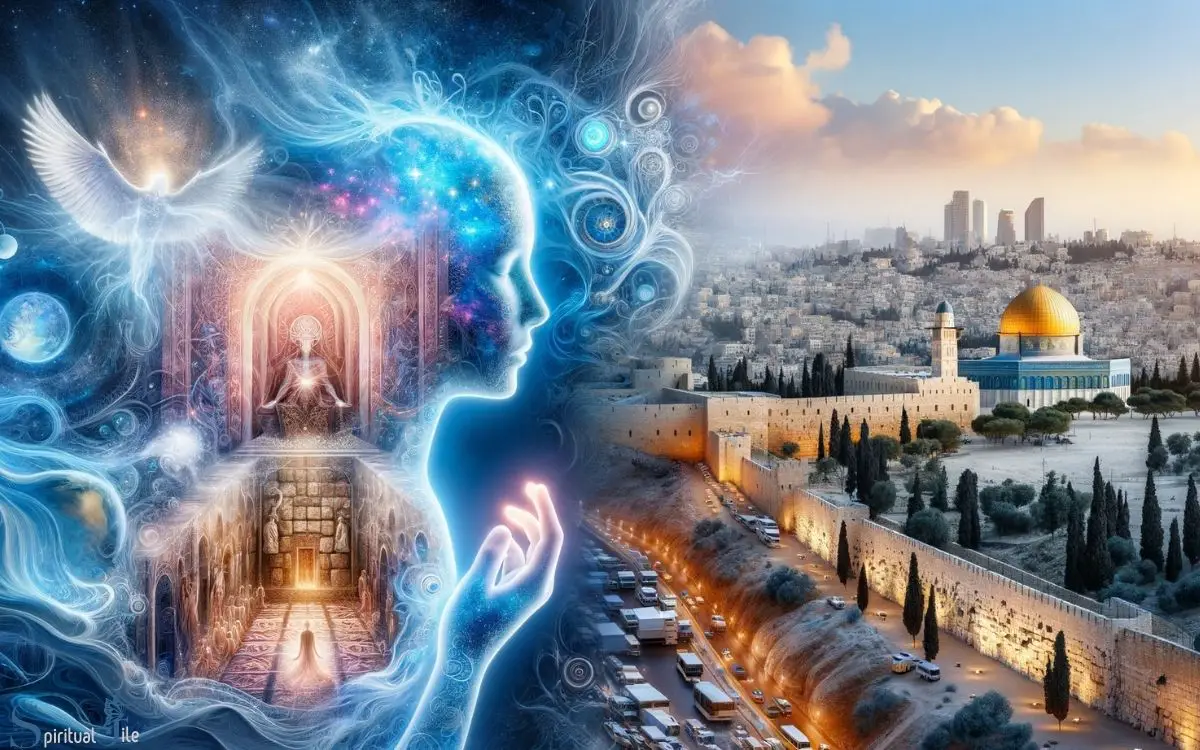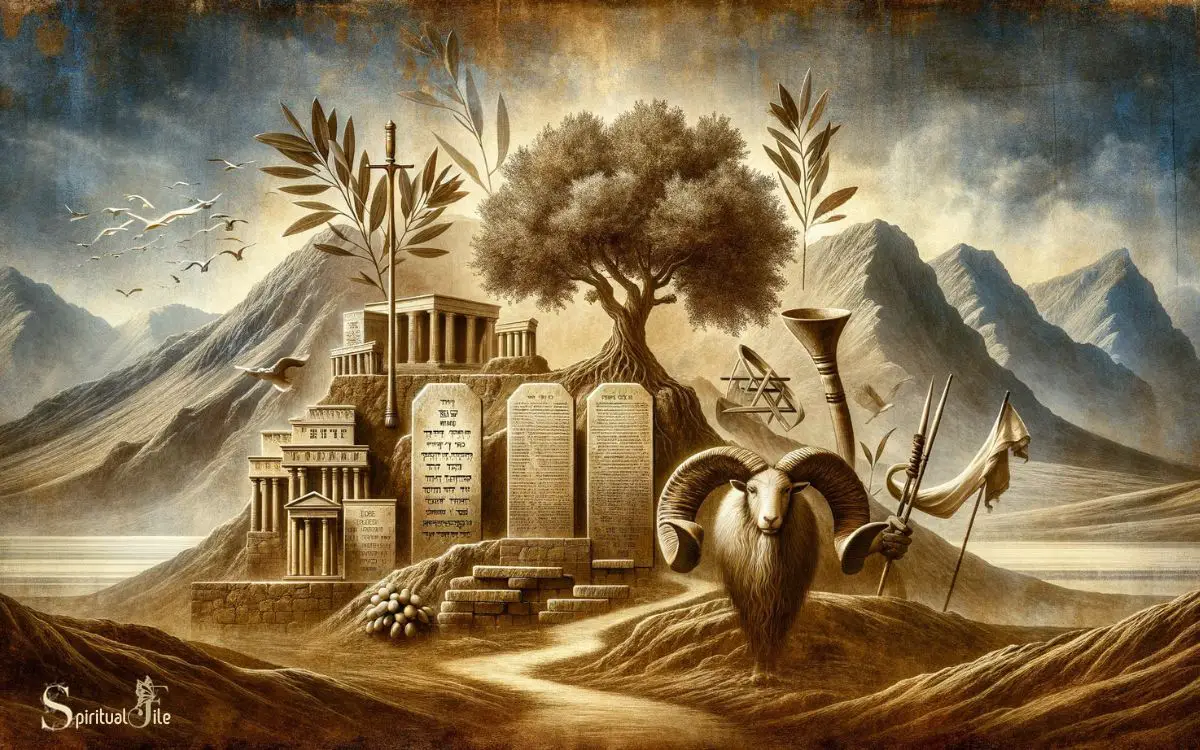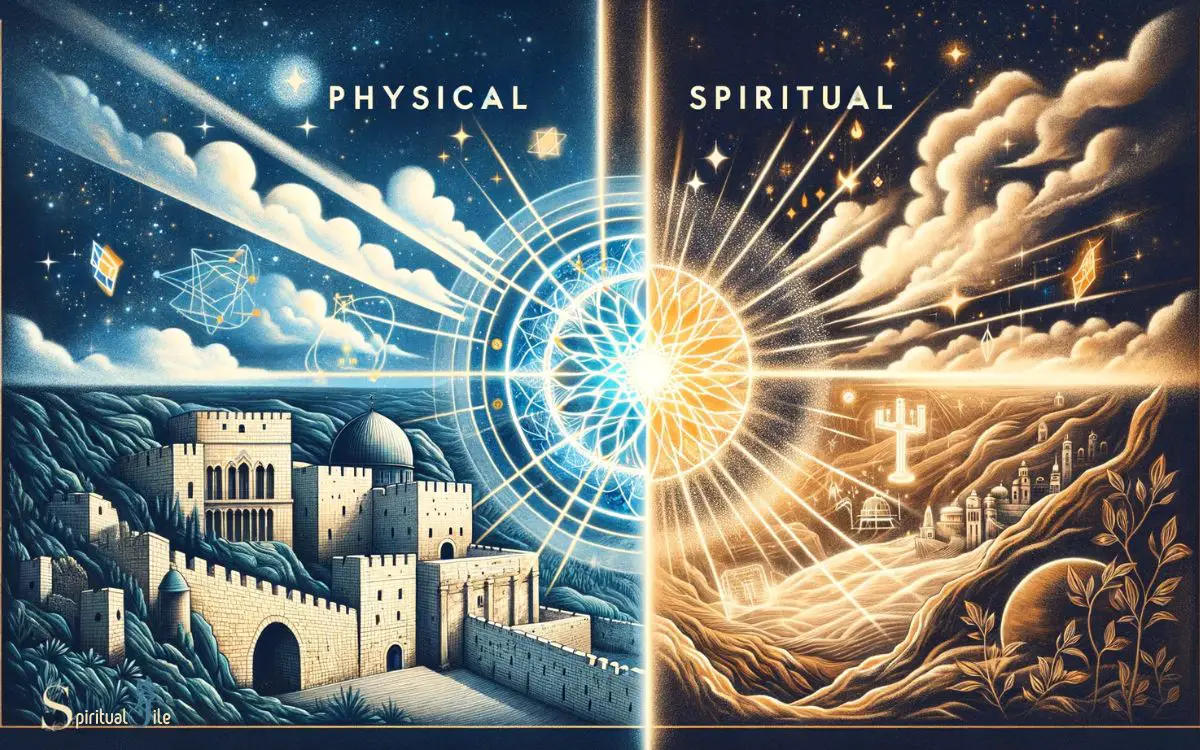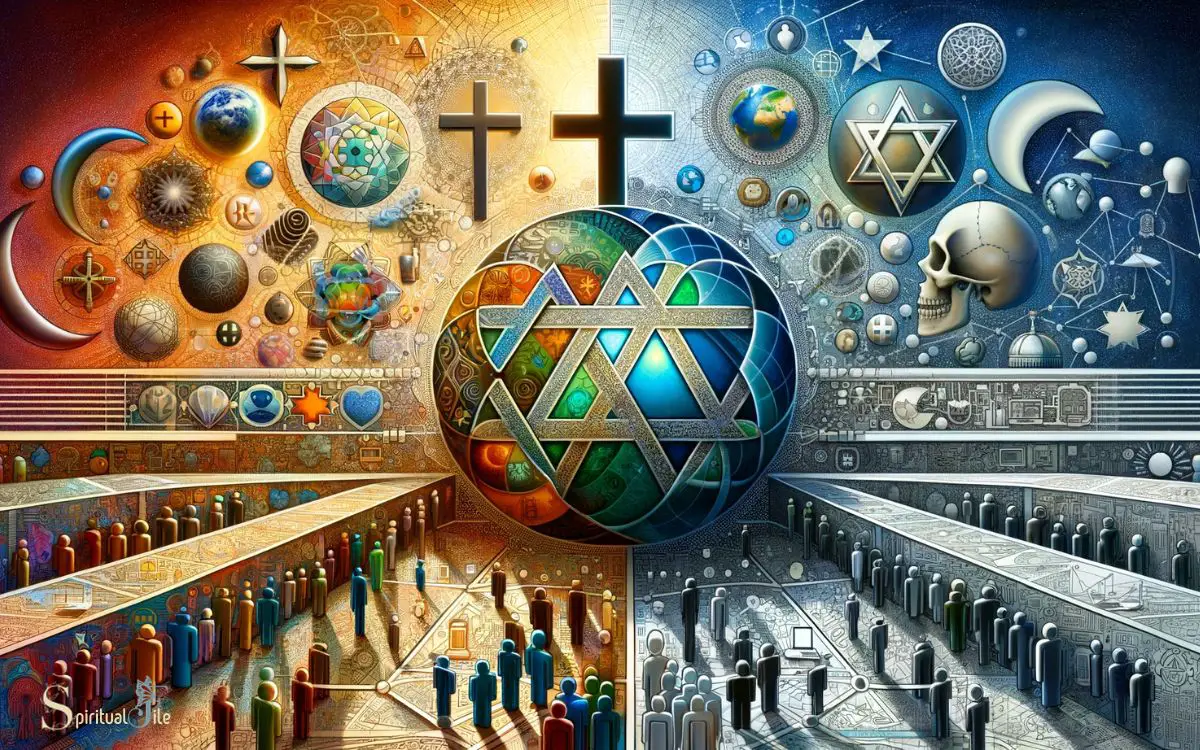Spiritual Israel Vs Physical Israel: Explain!
The distinction between spiritual Israel and physical Israel is a significant topic in theological studies, addressing the differences between the biblical nation of Israel and the spiritual community of believers in God.
Spiritual Israel refers to individuals of any ethnicity who have faith in God and embody the principles of His covenant, often associated with the Christian belief in the New Covenant.
Physical Israel, on the other hand, pertains to the ethnic descendants of Abraham, Isaac, and Jacob, and the nation state of Israel as recognized in the Old Testament and in contemporary geopolitics.
Spiritual Israel and physical Israel are two concepts that emerge from biblical scripture and have evolved in meaning over time.
Spiritual Israel: Often linked with the New Testament teachings, spiritual Israel encompasses believers who are seen as the heirs to the promises made to Abraham, not by physical lineage, but through faith in Jesus Christ.
Physical Israel: This refers to the Jewish people and the geopolitical entity of the State of Israel. In the Old Testament, the term Israel commonly denotes the twelve tribes descended from Jacob. Today, it also includes the sovereign nation established in 1948.
For example, in Christianity, the Apostle Paul speaks of a ‘true Israelite’ as one who has faith in Christ (Romans 2:28-29), thus expanding the definition beyond ethnicity.

Key Takeaway
4 Aspects: Spiritual Israel Vs Physical Israel
| Aspect | Spiritual Israel | Physical Israel |
|---|---|---|
| Nature | Symbolic, faith-based | Geographic, political |
| Significance | Religious identity, faith | Nation-state in the Middle East |
| Focus | Faith, belief, symbolism | Territory, government, culture |
| Borders | Boundless, spiritual | Defined, recognized |
Biblical Origins of Israel’s Identity

The biblical origins of Israel’s identity can be traced back to the ancient Hebrew patriarchs, who are regarded as the foundational figures of the nation. Abraham, Isaac, and Jacob, known as the patriarchs, are central to the concept of Israel’s identity.
The covenant God made with Abraham, promising to make his descendants into a great nation, forms the cornerstone of Israel’s identity. From Jacob’s twelve sons emerged the twelve tribes of Israel, establishing the lineage from which the nation emerged.
These biblical narratives not only provide a historical account but also convey the spiritual significance of Israel’s identity, rooted in divine promise and purpose.
Understanding the foundational figures and their covenantal relationship with God is essential to grasp the essence of Israel’s identity.
This historical perspective sets the stage for comprehending the concept of spiritual Israel, which delves deeper into the metaphysical and symbolic aspects of Israel’s identity.
The Concept of Spiritual Israel

The concept of Spiritual Israel delves into the symbolic versus literal interpretation of Israel. It also explores the covenant with Abraham and its fulfillment in the New Testament.
Understanding the spiritual aspect of Israel’s identity involves exploring its symbolic significance and the spiritual implications of the covenant with Abraham.
Additionally, examining how the New Testament fulfills and expands upon the spiritual dimensions of Israel’s identity provides a comprehensive understanding of Spiritual Israel.
Symbolic Vs Literal Israel
Symbolizing the spiritual concept of Israel, as opposed to strictly interpreting it literally, is a key aspect of understanding the notion of Spiritual Israel.
When approaching the concept of Spiritual Israel, it is important to consider:
- Symbolic Representation: Spiritual Israel represents a broader and more inclusive idea, encompassing all who have faith in God, rather than being limited to a specific ethnic or geographical group.
- Fulfillment of Prophecy: Many believe that the prophecies regarding Israel find their fulfillment in a spiritual sense, through the establishment of a new covenant and the inclusion of all believers in Christ.
- Universal Application: The spiritual concept of Israel transcends physical boundaries, emphasizing the universal nature of God’s plan for all people, regardless of nationality or heritage.
Understanding these aspects provides a deeper insight into the concept of Spiritual Israel and its significance in religious thought.
Transitioning into the subsequent section about the ‘covenant with Abraham,’ it becomes evident how the spiritual interpretation plays a crucial role in shaping religious understanding.
Covenant With Abraham
Transitioning from the symbolic representation of Spiritual Israel, the concept of the Covenant with Abraham plays a pivotal role in understanding the spiritual aspect of Israel and its significance in religious thought.
The Covenant with Abraham, found in the book of Genesis, is a fundamental aspect of spiritual Israel. It represents the promise made by God to Abraham, that he would be the father of a great nation and that all the nations of the earth would be blessed through his descendants.
This covenant is symbolic of the spiritual inheritance and blessings that extend beyond physical lineage.
Understanding the spiritual significance of this covenant is essential in comprehending the concept of Spiritual Israel. The table below illustrates the key elements of the Covenant with Abraham.
Here’s a table based on the provided information:
| Aspect | Covenant with Abraham |
|---|---|
| Promise of a great nation | Yes |
| Blessing to all nations | Yes |
| Circumcision as a sign of the covenant | Yes |
| Land inheritance | Yes |
| Spiritual significance beyond physical lineage | Yes |
New Testament Fulfillment
The New Testament brings further clarity to the concept of Spiritual Israel, elucidating its fulfillment and significance in religious doctrine.
- Jesus as the Fulfillment: The New Testament portrays Jesus as the ultimate fulfillment of the promises made to Israel, indicating a shift from physical lineage to spiritual inheritance.
- Inclusion of Gentiles: The concept of Spiritual Israel in the New Testament emphasizes the inclusion of Gentiles into the covenant family, emphasizing faith over ethnicity.
- Universal Salvation: The New Testament presents the idea of Spiritual Israel as a universal salvation, where all who believe become part of the spiritual lineage of Abraham, regardless of their physical heritage.
The Historical Evolution of Physical Israel

As physical Israel evolved historically, it faced numerous challenges and changes that shaped its identity and destiny. From its origins as a collection of tribes to the establishment of a monarchy under King Saul, David, and Solomon, Israel experienced periods of unity and division.
The Assyrian and Babylonian exiles were pivotal moments that tested the resilience of the nation, leading to the dispersion and eventual return of the Jewish people.
The Hellenistic period brought cultural influence and internal strife, while Roman occupation further impacted Israel’s autonomy.
These historical events not only molded physical Israel’s political and social landscape but also influenced its religious and cultural development.
Understanding the historical evolution of physical Israel is crucial in comprehending its significance within the broader context of spiritual Israel.
Theological Perspectives on Israel’s Identity

The theological perspectives on Israel’s identity shed light on the religious and spiritual dimensions that have shaped physical Israel’s historical evolution.
This understanding is crucial for appreciating the complexities of Israel’s identity and its significance in various theological frameworks.
Three key perspectives are essential for understanding Israel’s identity:
- Covenantal Theology: This perspective emphasizes the enduring covenant between God and the people of Israel, highlighting their chosen status and the theological implications of this covenant for Israel’s identity.
- Eschatological Interpretation: Many theological perspectives view Israel’s identity in light of eschatological events, interpreting the role of physical Israel in the culmination of history and the establishment of God’s kingdom.
- Biblical Typology: This perspective explores how Israel’s identity is intertwined with broader biblical themes, drawing parallels between the historical Israel and spiritual truths.
Understanding these perspectives is fundamental to comprehending the theological significance of Israel’s identity and its relevance in religious discourse.
The next section will delve into the covenantal promises to physical Israel.
Covenantal Promises to Physical Israel

Physical Israel’s covenantal promises are deeply rooted in their historical and religious heritage. These promises are outlined in the Torah and are seen as an everlasting covenant between God and the physical descendants of Abraham, Isaac, and Jacob.
The covenant includes promises of land, blessings, and protection, as well as the responsibility to uphold the commandments and statutes given by God.
The covenantal promises also encompass the expectation of a Messiah who will bring ultimate redemption and restoration to Israel.
Understanding these promises is crucial in comprehending the significance of physical Israel in the broader theological context. It provides a foundation for the unique relationship between God and the physical nation of Israel, shaping their identity and purpose in the divine plan.
This understanding sets the stage for exploring the role of spiritual Israel in modern Christianity.
The Role of Spiritual Israel in Modern Christianity

Analyze the role of spiritual Israel in modern Christianity, highlighting its significance in theological interpretation and religious practice.
- Spiritual Connection: Spiritual Israel represents the belief that the Christian community has inherited the promises made to Israel in the Old Testament, emphasizing a spiritual connection to God.
- Interpretive Framework: It provides a framework for interpreting biblical prophecies in light of the Christian faith, shaping the understanding of God’s redemptive plan for humanity.
- Religious Practice: Understanding spiritual Israel influences Christian worship, ethics, and mission, as it informs the perception of the Church’s identity and purpose in the world.
Understanding the role of spiritual Israel in modern Christianity is crucial for comprehending the theological and practical implications of this concept.
This understanding sets the stage for comparing the roles of physical and spiritual Israel in the broader context of religious thought and practice.
Comparing the Roles of Physical and Spiritual Israel

In understanding the comparison of the roles of physical and spiritual Israel, it is crucial to consider the concept of covenant fulfillment through Jesus.
This comparison also involves examining the historical and theological significance of Israel as the chosen people of God.
Covenant Fulfillment Through Jesus
Fulfillment of the covenant through Jesus is a pivotal aspect that frequently distinguishes the roles of spiritual and physical Israel.
The fulfillment of the covenant through Jesus has profound implications for both spiritual and physical Israel, and it highlights the unique roles each plays in the fulfillment of God’s promises.
- Spiritual Fulfillment: Jesus, as the fulfillment of the covenant, brings spiritual redemption and reconciliation with God for those who believe in Him.
- Universal Access: Jesus’ fulfillment of the covenant extends the promise of salvation to all people, transcending the boundaries of physical Israel.
- New Covenant: Through Jesus, a new covenant is established, surpassing the limitations of the old covenant and providing a path to spiritual fulfillment for all who seek it.
The fulfillment of the covenant through Jesus thus underscores the distinct yet interconnected roles of spiritual and physical Israel in God’s redemptive plan.
Israel as Chosen People
The distinction between the roles of physical and spiritual Israel as chosen people is essential in understanding their respective significance in God’s redemptive plan.
Physical Israel, as the chosen nation of God in the Old Testament, played a crucial role in preserving the lineage through which the promised Messiah, Jesus Christ, would come.
On the other hand, spiritual Israel, comprising believers from all nations, is chosen to spread the message of salvation and demonstrate God’s love to the world.
The table below provides a concise comparison of the roles of physical and spiritual Israel as chosen people:
| Aspect | Physical Israel | Spiritual Israel |
|---|---|---|
| Selection | Chosen as a nation | Chosen as individuals from all nations |
| Purpose | Preserved the lineage for the Messiah | Spread the message of salvation and God’s love |
Understanding these distinctions is vital in comprehending the continuity and expansion of God’s redemptive plan through the roles of physical and spiritual Israel.
Implications for Contemporary Religious Discourse

Contemporary religious discourse is significantly impacted by the distinction between spiritual Israel and physical Israel.
This has several implications for religious discussions and theological understanding:
- Interfaith Dialogue: The concept of spiritual Israel allows for a broader understanding of God’s chosen people, facilitating more inclusive and respectful interfaith dialogues.
- Theological Interpretation: The distinction challenges traditional interpretations of biblical prophecies and the role of Israel in the modern world, prompting a reevaluation of theological perspectives.
- Ethical Considerations: Understanding the spiritual nature of Israel raises questions about the ethical responsibilities of individuals and communities towards the broader concept of God’s chosen people, transcending geographical and cultural boundaries.
FAQ About Spiritual Israel Vs Physical Israel
How Does the Concept of Spiritual Israel Impact the Political and Social Identity of Modern-Day Israel?
The concept of spiritual Israel impacts the political and social identity of modern-day Israel by influencing how some view the nation’s role in fulfilling religious prophecies.
Are There Any Specific Rituals or Practices That Differentiate Spiritual Israel From Physical Israel in Modern Christianity?
In modern Christianity, specific rituals and practices differentiate spiritual Israel from physical Israel.
These may include baptism, communion, and the practice of spiritual gifts, which are emphasized as essential components of spiritual Israel’s identity and expression of faith.
How Do Theological Perspectives on Israel’s Identity Impact the Relationship Between Judaism and Christianity?
Theological perspectives on Israel’s identity significantly impact the relationship between Judaism and Christianity.
These perspectives influence interpretations of scripture, understandings of covenant, and the role of Israel in God’s plan, shaping the dialogue and interaction between the two faiths.
What Are the Implications of the Roles of Physical and Spiritual Israel for Interfaith Dialogue and Understanding?
The implications of the roles of physical and spiritual Israel for interfaith dialogue and understanding are significant.
Understanding these roles can foster mutual respect and facilitate meaningful discussions, leading to greater harmony and cooperation among different faith traditions.
How Do Contemporary Religious Leaders Navigate the Complexities of Interpreting the Covenantal Promises to Physical Israel in Light of the Concept of Spiritual Israel?
Contemporary religious leaders navigate the complexities of interpreting covenantal promises to physical Israel in light of the concept of spiritual Israel by engaging in thoughtful dialogue, seeking understanding.
Conclusion
The comparison between spiritual and physical Israel reveals a complex and multifaceted understanding of Israel’s identity.
While physical Israel has a rich historical and theological significance, the concept of spiritual Israel plays a crucial role in modern Christianity.
As of 2021, approximately 2.3 billion people around the world identify as Christians, demonstrating the enduring relevance of the concept of spiritual Israel in contemporary religious discourse.






